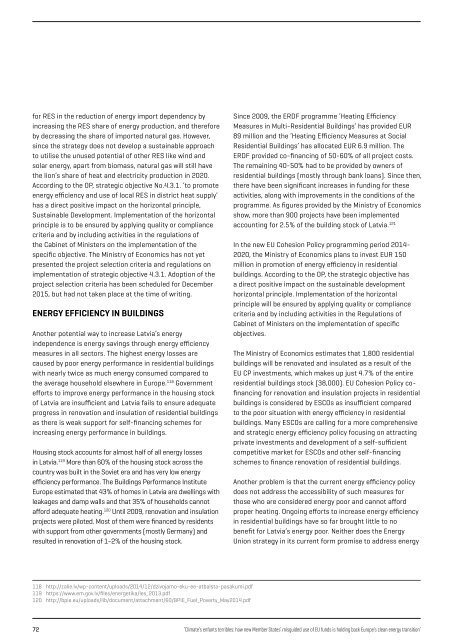ENFANTS TERRIBLES
enfants-terribles
enfants-terribles
You also want an ePaper? Increase the reach of your titles
YUMPU automatically turns print PDFs into web optimized ePapers that Google loves.
for RES in the reduction of energy import dependency by<br />
increasing the RES share of energy production, and therefore<br />
by decreasing the share of imported natural gas. However,<br />
since the strategy does not develop a sustainable approach<br />
to utilise the unused potential of other RES like wind and<br />
solar energy, apart from biomass, natural gas will still have<br />
the lion’s share of heat and electricity production in 2020.<br />
According to the OP, strategic objective No.4.3.1. ‘to promote<br />
energy efficiency and use of local RES in district heat supply’<br />
has a direct positive impact on the horizontal principle,<br />
Sustainable Development. Implementation of the horizontal<br />
principle is to be ensured by applying quality or compliance<br />
criteria and by including activities in the regulations of<br />
the Cabinet of Ministers on the implementation of the<br />
specific objective. The Ministry of Economics has not yet<br />
presented the project selection criteria and regulations on<br />
implementation of strategic objective 4.3.1. Adoption of the<br />
project selection criteria has been scheduled for December<br />
2015, but had not taken place at the time of writing.<br />
ENERGY EFFICIENCY IN BUILDINGS<br />
Another potential way to increase Latvia’s energy<br />
independence is energy savings through energy efficiency<br />
measures in all sectors. The highest energy losses are<br />
caused by poor energy performance in residential buildings<br />
with nearly twice as much energy consumed compared to<br />
the average household elsewhere in Europe. 118 Government<br />
efforts to improve energy performance in the housing stock<br />
of Latvia are insufficient and Latvia fails to ensure adequate<br />
progress in renovation and insulation of residential buildings<br />
as there is weak support for self-financing schemes for<br />
increasing energy performance in buildings.<br />
Housing stock accounts for almost half of all energy losses<br />
in Latvia. 119 More than 60% of the housing stock across the<br />
country was built in the Soviet era and has very low energy<br />
efficiency performance. The Buildings Performance Institute<br />
Europe estimated that 43% of homes in Latvia are dwellings with<br />
leakages and damp walls and that 35% of households cannot<br />
afford adequate heating. 120 Until 2009, renovation and insulation<br />
projects were piloted. Most of them were financed by residents<br />
with support from other governments (mostly Germany) and<br />
resulted in renovation of 1-2% of the housing stock.<br />
Since 2009, the ERDF programme ‘Heating Efficiency<br />
Measures in Multi-Residential Buildings’ has provided EUR<br />
89 million and the ‘Heating Efficiency Measures at Social<br />
Residential Buildings’ has allocated EUR 6.9 million. The<br />
ERDF provided co-financing of 50-60% of all project costs.<br />
The remaining 40-50% had to be provided by owners of<br />
residential buildings (mostly through bank loans). Since then,<br />
there have been significant increases in funding for these<br />
activities, along with improvements in the conditions of the<br />
programme. As figures provided by the Ministry of Economics<br />
show, more than 900 projects have been implemented<br />
accounting for 2.5% of the building stock of Latvia. 121<br />
In the new EU Cohesion Policy programming period 2014-<br />
2020, the Ministry of Economics plans to invest EUR 150<br />
million in promotion of energy efficiency in residential<br />
buildings. According to the OP, the strategic objective has<br />
a direct positive impact on the sustainable development<br />
horizontal principle. Implementation of the horizontal<br />
principle will be ensured by applying quality or compliance<br />
criteria and by including activities in the Regulations of<br />
Cabinet of Ministers on the implementation of specific<br />
objectives.<br />
The Ministry of Economics estimates that 1,800 residential<br />
buildings will be renovated and insulated as a result of the<br />
EU CP investments, which makes up just 4.7% of the entire<br />
residential buildings stock (38,000). EU Cohesion Policy cofinancing<br />
for renovation and insulation projects in residential<br />
buildings is considered by ESCOs as insufficient compared<br />
to the poor situation with energy efficiency in residential<br />
buildings. Many ESCOs are calling for a more comprehensive<br />
and strategic energy efficiency policy focusing on attracting<br />
private investments and development of a self-sufficient<br />
competitive market for ESCOs and other self-financing<br />
schemes to finance renovation of residential buildings.<br />
Another problem is that the current energy efficiency policy<br />
does not address the accessibility of such measures for<br />
those who are considered energy poor and cannot afford<br />
proper heating. Ongoing efforts to increase energy efficiency<br />
in residential buildings have so far brought little to no<br />
benefit for Latvia’s energy poor. Neither does the Energy<br />
Union strategy in its current form promise to address energy<br />
118<br />
119<br />
120<br />
http://zalie.lv/wp-content/uploads/2014/12/dzivojamo-eku-ee-atbalsta-pasakumi.pdf<br />
https://www.em.gov.lv/files/energetika/les_2013.pdf<br />
http://bpie.eu/uploads/lib/document/attachment/60/BPIE_Fuel_Poverty_May2014.pdf<br />
72<br />
‘Climate’s enfants terribles: how new Member States’ misguided use of EU funds is holding back Europe’s clean energy transition’


